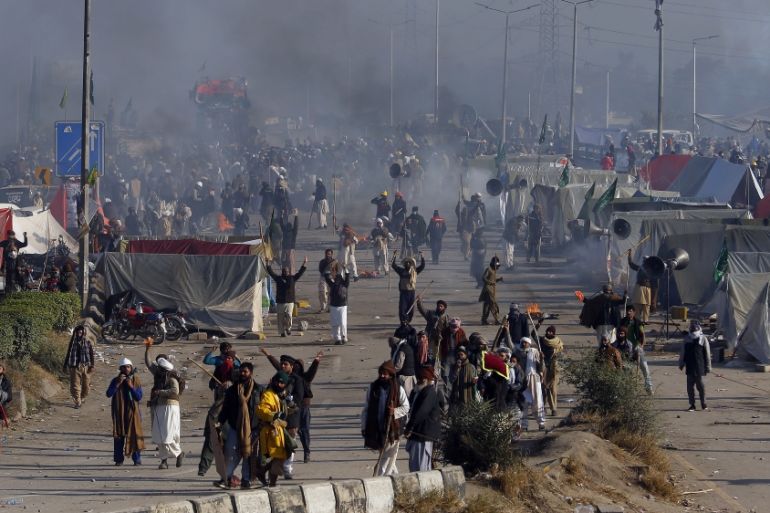What were the protests in Pakistan about?
Pakistan government and military have allowed religious hardliners to win a case in favour of bigotry.

In a depressing turn of events, the government of Pakistan surrendered to hardliners on Monday morning and accepted their demands for the resignation of the country’s law minister Zahid Hamid. This capitulation of the democratically elected government came after countrywide clashes between the police and protesters which resulted in at least six deaths and hundreds injured.
Protesters believed that the law minister had amended the declaration of faith which confirmed belief in the finality of Prophethood of Prophet Muhammad in the Election Act of 2017. Therefore, to them, he insulted Islam and his actions amounted to blasphemy. The parliament undid the amendment and called it a “clerical error”.
Hardline political party Tehreek Labbaik Ya Rasool Allah (TLYR) organised a weeks-long sit-in which escalated into clashes the past few days. Ordinary citizens looked on helplessly at the chaotic unravelling of the state. Cable news channels and social media networks like Facebook, YouTube and Twitter were blocked across Pakistan for over 24 hours. The crisis was resolved through the arbitration of the military.
Hamid was intimidated into releasing a video on social media in which he apologised for hurting religious sentiments and reassured the sectarian hardliners that the persecuted religious minority Ahmadis of Pakistan are “non-Muslims” to him. It was a statement which was supposed to highlight the strength of the minister’s faith.
The government’s capitulation to TLYR’s demands sends yet again a message to ambitious clerics that the use of religion in Pakistan for political gain works.
Appeasing hardliners
Interestingly, the TLYR’s supporters belong to a South Asian Islamic movement of the Hanafi school called the Barelvi, which traditionally has been considered tolerant and closer to Sufi thought. Since 9/11 the Pakistani government and Western countries engaged in the “war on terror” and invasion of Afghanistan have labelled them as moderates.
They have been perceived as a counterforce to more extreme and sectarian militant outfits. The US even gave funding to Barelvi groups for denouncing terrorist attacks in Pakistan. But the deliberate ideological weaponisation of conservative religious groups perceived as moderates did not neutralise fighter groups as expected.
Instead, they were empowered and allowed to grow increasingly conservative and confrontational.
For decades they were allowed to practise their bigotry on non-Muslim citizens. They have been allowed to use religion in politics and themselves have been used in power games between various civilian and military forces. Today, their tactics of fabricating alleged incidents of blasphemy to trap minorities and even Muslims to gain popularity and whip up religious sentiments for political or economic gains are being used on the government.
The events of the last few weeks have demonstrated exactly how effective of a tool they are. They are easily able to mobilise large groups of men, wreak havoc, attack government officials’ houses, block highways, get ministers to resign and destabilise governments.
What is clear is that the state has not learned anything from its history of appeasement of hardliners and has again given in.
It has simply failed to enforce its writ where it most needed to, but it has no qualms in treating voices critical of its policies without mercy. The hypocrisy is what is utterly soul-crushing.
A year of human rights violations
The reason why this entire episode hurts the civil society, media and minorities so much is that 2017 has already been a year of a deteriorating human rights situation. It started with the abduction of five activist bloggers, four of whom were released after torture and scathing smear campaigns. The four fled the country and one is still missing.
Then a Muslim progressive student was brutally lynched to death in broad daylight by his fellows inside the university’s vicinity over allegations of insulting Islam on Facebook which he hadn’t done.
Throughout the year there were other forced disappearances of activists, academics and journalists, faith-based target killings of religious minorities, and violence against journalists and human rights defenders. And of course, there was continuous political manipulation of religious issues, inciting hate and dangerous speech against persecuted groups.
The government has kept instilling fear among citizens by making it clear that Pakistani online spaces will be monitored for blasphemous content. The state authorities frequently sent mass text messages to citizens asking them to report blasphemous speech on the internet and in the press.
Interestingly, Pakistani political leaders, including disqualified Prime Minister Nawaz Sharif, have repeatedly spoken out against Islamophobia in the West. But they haven’t expressed any sincere concerns over religious tolerance and rights of marginalised minorities in their own homeland.
If Pakistan could give any advice to the West on Islamophobia, it would be this: Do not take our example, be more inclusive and do not let the political or religious right dictate government agenda!
The views expressed in this article are the author’s own and do not necessarily reflect Al Jazeera’s editorial policy.
